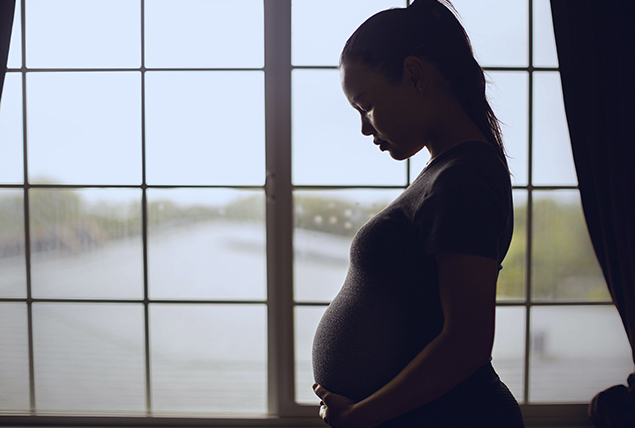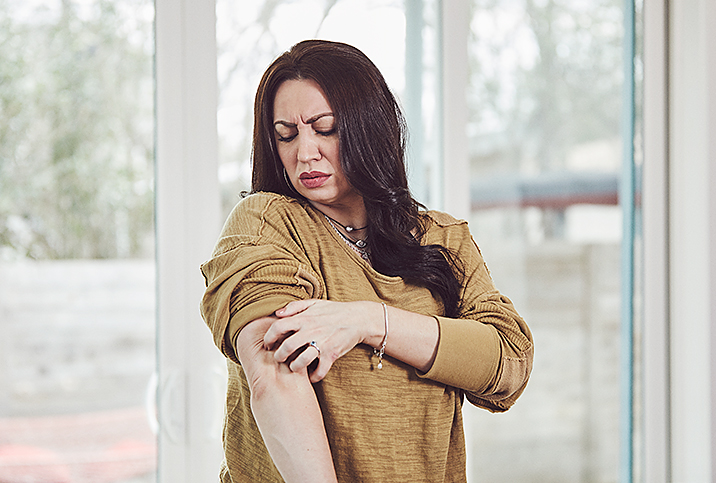What Should You Expect From Anxiety Disorders When You're Expecting?

I've dealt with generalized anxiety disorder and panic attacks since my early teens, so I'm going on 20 years now. One of my biggest concerns about going into pregnancy and motherhood was not knowing what to expect when it came to anxiety.
Would my anxiety get worse? How would I manage my symptoms? Now that I am expecting those questions have become even more pressing.
Here's some of what you might need to know about pre-diagnosed anxiety disorders during pregnancy, as well as tips on managing symptoms.
What should you expect from anxiety disorders during pregnancy?
Women previously diagnosed with generalized anxiety disorder or other anxiety disorders may experience increased symptoms during pregnancy, said Emily Guarnotta, Psy.D., a licensed clinical psychologist in New York State.
"This is due to the hormonal changes that occur and the stress of coping with a pregnancy and preparing for parenthood," Guarnotta said.
"Pregnancy causes changes in estrogen, progesterone and cortisol. These changes are believed to play a role in increased anxiety during pregnancy," Guarnotta said.
Many women's anxiety is greatest during the first trimester of pregnancy because of the significant hormonal changes, she added.
From human chorionic gonadotropin hormone (hCG) and human placental lactogen (hPL) made during pregnancy to increases in progesterone and estrogen, a woman's body or people AFAB experience many changing hormone levels, according to Johns Hopkins Medicine.
"This may be especially true for a woman who is considered a high-risk pregnancy or who has other difficult environmental stressors going on as a result of her pregnancy," said Gail Saltz, M.D., a psychiatrist and clinical associate professor of psychiatry at the NY Presbyterian Hospital Weill-Cornell School of Medicine.
Added stress, Saltz said, can increase symptoms of an anxiety disorder.
The symptoms of an anxiety disorder during pregnancy, according to Harvard Medical, may include the following:
- Obsessive worrying
- Restlessness
- Inability to concentrate
- Trouble sleeping due to worrying
Are anxiety disorders while pregnant common?
Anxiety disorders affect 1 in 5 women during pregnancy and postpartum, suggests a 2019 study. If you aren't feeling your best mentally, you aren't alone.
Everyone's experience is different, Guarnotta reminded. Some women with a history of anxiety may report feeling much better during pregnancy. However, she noted that women who experience decreased anxiety symptoms during pregnancy may see a return in symptoms during the postpartum period.
"I would caution women to be aware of this and take steps to prepare for the possibility of a return in their symptoms after birth," Guarnotta advised.
"Anxiety disorders postpartum can result in diminished parenting skills like irritability, harshness, or disinterest and neglect, overwhelming guilt and symbiosis," Saltz said. "It can also result in increased anxiety in the child."
For these reasons, Saltz stresses the importance for a mother to get treatment during pregnancy and postpartum.
How can you manage anxiety disorders during pregnancy?
To help manage anxiety during pregnancy, Guarnotta recommends first pinpointing the source of anxiety.
"For example, are you feeling nervous about what it will be like to care for a baby or the impact on your work or financial situation?" she asked. "Or are you feeling isolated from friends and family? Or are you even feeling fearful about the process of giving birth and what could potentially go wrong?"
Guarnotta suggests taking action on the things within your control and will help you feel better, such as taking a childbirth preparation class or creating a financial plan if those are the sources of your anxiety.
For stressors outside your control, Guarnotta suggests practicing emotional coping techniques like radical acceptance and mindfulness.
Anxiety disorders are responsive to treatment, so the sooner you seek help from a professional, the better, especially if your anxiety is worsening, Saltz noted. Bringing up your anxiety at your first prenatal visit will help you and your doctor determine best treatment options.
"Treatment can be a type of psychotherapy such as CBT [cognitive behavioral therapy] or psychodynamic psychotherapy," she said.
Can you take anxiety medication during pregnancy?
If therapy and coping skills aren’t sufficient enough to deal with an anxiety disorder during pregnancy, medication can be an option. Deciding whether or not to take anxiety medication during pregnancy should be carefully weighed with a psychiatrist specializing in perinatal mood and anxiety disorders, Guarnotta emphasized.
"This is a very individualized decision, so there is no correct answer that applies to all people," Guarnotta said.
Not all anxiety medications are safe during pregnancy. Benzodiazepines are a poor choice during pregnancy as they are unsafe in the first and third trimesters, Saltz shared. Certain antidepressants, such as Paroxetine (Paxil) have a higher risk of negative effects, so they are generally avoided, Guarnotta added.
On the other hand, Zoloft, and its generic form, sertraline, is a commonly prescribed antidepressant during pregnancy.
"Even though it is an antidepressant, it can also help alleviate anxiety," Guarnotta said. "While many providers feel that it is generally safe to take during pregnancy, it is not without side effects that patients should be made aware of."
Prenatal anxiety is associated with negative complications, such as preterm birth and low birth weight, Guarnotta noted.
"So it is important that healthcare providers carefully weigh the risks and benefits of medication versus untreated anxiety with their patients," she said.
"The medication choice is something that should be decided with a psychiatrist and is very individual, with individual considerations of symptom cluster, family history, sometimes genetic testing, side effect tolerance, etc., to decide which med is safe for you," Saltz added.
The bottom line
Don't let anxiety get the best of you. Unfortunately, too many people don't seek treatment for anxiety. Your mental health matters. Speak with your doctor to determine the best treatment option for your situation.


















